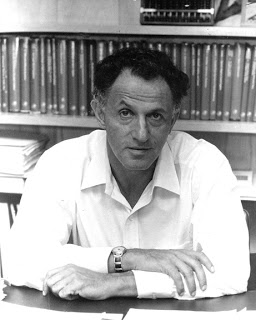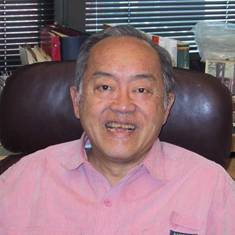George Leitmann (born May 24, 1925) is an Austrian-born American engineering scientist and educator.
George Leitmann (born May 24, 1925) is an Austrian-born American engineering scientist and educator.
Leitmann was born on May 24, 1925, to a fully assimilated Jewish family in Vienna, Austria. His paternal grandfather was a career officer with the rank of lieutenant colonel in the Imperial Army. His father had been a volunteer in the Austrian Army in World War I and was wounded twice on the Serbian front. [1] [2]
Nonetheless, by the spring of 1940 the situation in Austria had become so dangerous that George's father fled to neighboring Yugoslavia, still an independent kingdom, and the rest of the family, George, his mother and two grandmothers, were able to emigrate to the US in April 1940. Tragically, Yugoslavia was occupied by Germany a year later and George's father was murdered in a concentration camp in Nis, Serbia. [3]
George attended a Technical High School in New York from which he graduated in December 1943, whereupon he immediately volunteered for the Army and was inducted in February 1944 into a Combat Engineer Battalion, which began its combat duties in France and Germany in late 1944. During the battle of the Colmar Pocket, George's unit was attached to the French First Army which liberated Colmar. For George's performance in this action as a member of the reconnaissance unit, he was awarded the Croix de Guerre avec Palme.
After the end of the war in Europe, George was transferred to the Army Counter Intelligence Corps as its youngest Special Agent and, among other assignments, served as an interrogator at the Nuremberg War Crimes Trial. In 1955, he married Nancy Lloyd. They have two children, son Josef, and daughter Elaine, as well as three grandchildren and two great-grandchildren.
After the discharge from the army in May 1946, George studied physics at Columbia University and received the BA and MS degrees in 1949 and 1950, respectively. From 1950 to 1957 he was employed at the US Naval Ordnance Station (USNOTS), China Lake, California, first as a physicist and then head of the aeroballistics analysis section. This assignment involved both theoretical as well as experimental research in the exterior ballistics of rockets. While working at USNOTS, he also enrolled in the PhD program of the University of California, Berkeley, from which he received the PhD in engineering science in 1956. He joined the engineering faculty at UC Berkeley in 1957 as an assistant professor, and was advanced to associate professor in 1959 and professor in 1963. He was emerited in 1991 and continued both research and university service until 2018. [4]
George contributed greatly to the theory of optimal control, dynamic games, and operations research, as well as applications to exterior ballistics of rockets, aerospace systems, economics, ecology, epidemiology, counterterrorism, and others, reported in 15 books (including An Introduction to Optimal Control, The Calculus of Variations and Optimal Control, Qualitative and Quantitative Differential Games, and Cooperative and Non-cooperative Many Player Games) and over 300 technical journal articles. [5] His service to the academic community, especially the University of California, Berkeley, ranged from four Associate Deanships, Academic Senate Committee Service such as the Budget Committee, chair of the Committee on Privilege and Tenure, the first University Ombudsman during the riot-ridden late sixties, and many advisory committees such as the chair of the system-wide Advisory Committee on Research Expeditions Programs. He also served the wider academic community by service on advisory boards at other universities. [6] [5]
George has held membership in many professional and government committees. He was the Founding President of the American Alexander von Humboldt Association (1994–1997). He was Co-Editor of the Journal of Mathematical Analysis and Applications for 16 years and serves/ed as associate editor of four journals and editorial board member of eight journals. [4]
The following constitutes a partial list. He is a member of the US National Academy of Engineering [4] [7] and a Foreign or Corresponding Member of six other national Academies of Science or Engineering. He holds honorary doctorates from three universities (University of Paris, Technical University of Vienna, and Technical University of Darmstadt). His numerous prizes and medals include: the Senior Scientist Prize, Heisenberg and Humboldt Medals of the Humboldt Foundation, the Austrian Cross of Honor for Science and Art, [8] the Levy Medal of the Franklin Institute, [9] the Oldenburger Medal of the ASME, [10] the first Isaacs Award (shared with Professor Y. C. Ho) of the International Society of Dynamic Games, [11] and the Bellman Control Heritage Award of the American Automatic Control Council. [12] He is a Commander of the German and Italian Orders of Merit. In 2013 he became Chevalier de la Légion d'honneur (Knight of the Legion of Honor) [13]

Rudolf Emil Kálmán was a Hungarian-American electrical engineer, mathematician, and inventor. He is most noted for his co-invention and development of the Kalman filter, a mathematical algorithm that is widely used in signal processing, control systems, and guidance, navigation and control. For this work, U.S. President Barack Obama awarded Kálmán the National Medal of Science on October 7, 2009.

Richard Ernest Bellman was an American applied mathematician, who introduced dynamic programming in 1953, and made important contributions in other fields of mathematics, such as biomathematics. He founded the leading biomathematical journal Mathematical Biosciences, as well as the Journal of Mathematical Analysis and Applications.

Clayton Daniel Mote Jr. is the President Emeritus of the National Academy of Engineering. He served as the president of the NAE from July 2013 to June 2019. He also served as President of the University of Maryland, College Park from September 1998 until August 2010. From 1967 to 1991, Mote was a professor in mechanical engineering at the University of California, Berkeley, and served as Vice Chancellor at Berkeley from 1991 to 1998. Mote is a judge for the Queen Elizabeth Prize for Engineering.
Thomas B. Sheridan is American professor of mechanical engineering and Applied Psychology Emeritus at the Massachusetts Institute of Technology. He is a pioneer of robotics and remote control technology.
Eliahu Ibrahim Jury was an Iraqi-born American engineer. He received his the E.E. degree from the Technion – Israel Institute of Technology, Haifa, Mandatory Palestine, in 1947, the M.S. degree in electrical engineering from Harvard University, Cambridge, MA, in 1949, and the Sc.D. degree degree from Columbia University of New York City in 1953. He was professor of electrical engineering at the University of California, Berkeley, and the University of Miami.
Rufus Philip Isaacs was a game theorist especially prominent in the 1950s and 1960s with his work on differential games.
Roger Ware Brockett was an American control theorist and the An Wang Professor of Computer Science and Electrical Engineering at Harvard University, who founded the Harvard Robotics Laboratory in 1983.
A native of Terre Haute, Indiana, Stuart E. Dreyfus is professor emeritus at University of California, Berkeley in the Industrial Engineering and Operations Research Department. While at the Rand Corporation he was a programmer of the JOHNNIAC computer. While at Rand he coauthored Applied Dynamic Programming with Richard Bellman. Following that work, he was encouraged to pursue a Ph.D. which he completed in applied mathematics at Harvard University in 1964, on the calculus of variations. In 1962, Dreyfus simplified the Dynamic Programming-based derivation of backpropagation using only the chain rule. He also coauthored Mind Over Machine with his brother Hubert Dreyfus in 1986.

Yu-Chi "Larry" Ho is a Chinese-American mathematician, control theorist, and a professor at the School of Engineering and Applied Sciences, Harvard University.
Mustafa Tamer Başar is a control and game theorist who is the Swanlund Endowed Chair and Center for Advanced Study Professor of Electrical and Computer Engineering at the University of Illinois at Urbana-Champaign, USA. He is also the Director of the Center for Advanced Study.
Michael Athans was a Greek-American control theorist and a Professor Emeritus in the Department of Electrical Engineering and Computer Science at the Massachusetts Institute of Technology. He was a Fellow of the IEEE (1973) and a Fellow of the AAAS (1977). He was the recipient of numerous awards for his contributions in the field of control theory. A pioneer in the field of control theory, he helped shape modern control theory and spearheaded the field of multivariable control system design and the field of robust control. Athans was a member of the technical staff at Lincoln Laboratory from 1961 to 1964, and a Department of Electrical Engineering and Computer Science faculty member from 1964 to 1998. Upon retirement, Athans moved to Lisbon, Portugal, where he was an Invited Research Professor in the Institute for Systems and Robotics, Instituto Superior Técnico where he received a honoris causa doctorate from the Universidade Técnica de Lisboa in 2011.
The Rufus Oldenburger Medal is an award given by the American Society of Mechanical Engineers recognizing significant contributions and outstanding achievements in the field of automatic control. It was established in 1968 in the honor of Rufus Oldenburger.
The IEEE Control Systems Award is a technical field award given to an individual by the Institute of Electrical and Electronics Engineers (IEEE) "for outstanding contributions to control systems engineering, science or technology". It is an IEEE-level award, created in 1980 by the board of directors of the IEEE, but sponsored by the IEEE Control Systems Society.

Dimitri Panteli Bertsekas is an applied mathematician, electrical engineer, and computer scientist, a McAfee Professor at the Department of Electrical Engineering and Computer Science in School of Engineering at the Massachusetts Institute of Technology (MIT), Cambridge, Massachusetts, and also a Fulton Professor of Computational Decision Making at Arizona State University, Tempe.
Masayoshi Tomizuka is a professor in Control Theory in Department of Mechanical Engineering, University of California, Berkeley. He holds the Cheryl and John Neerhout, Jr., Distinguished Professorship Chair. Tomizuka received his B.S. and M.S. degrees in mechanical engineering from Keio University, Tokyo, Japan in 1968 and 1970, and his Ph.D. in mechanical engineering from the Massachusetts Institute of Technology in February 1974. He was elected to the National Academy of Engineering in 2022.

Constance J. Chang-Hasnain is chairperson and founder of Berxel Photonics Co. Ltd. and Whinnery Professor Emerita of the University of California, Berkeley. She was President of Optica in 2021.
Joseph Pierre LaSalle was an American mathematician specialising in dynamical systems and responsible for important contributions to stability theory, such as LaSalle's invariance principle which bears his name.
Rufus Oldenburger was an American mathematician and mechanical engineer.

Ali Galip Ulsoy is an academic at the University of Michigan (UM), Ann Arbor, where he is the C.D. Mote Jr. Distinguished University Professor Emeritus of Mechanical Engineering and the William Clay Ford Professor Emeritus of Manufacturing.
Huei Peng was an American control researcher and the Roger L. McCarthy Professor of Mechanical Engineering at the University of Michigan. He made contributions in adaptive control and optimal control, with emphasis on their applications to vehicular and transportation systems, design and control of electrified vehicles, hybrid vehicle drivetrains, and connected and autonomous vehicles. In recognition of his achievements, he was made a fellow of Society of Automotive Engineers (SAE) and the American Society of Mechanical Engineers (ASME). His specific contributions to the application of control theories to ground vehicles includes: